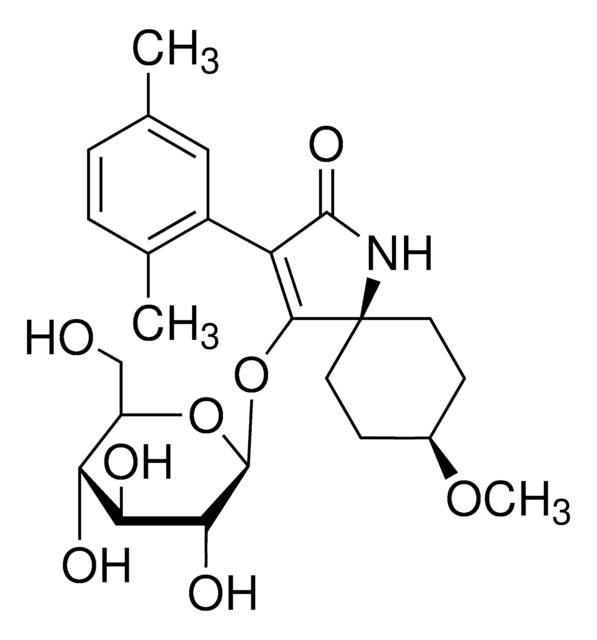33226
Glycin
puriss. p.a., reag. Ph. Eur., buffer substance, 99.7-101% (calc. to the dried substance)
Synonym(e):
Aminoessigsäure, Aminoethansäure, Glycokoll
About This Item
Empfohlene Produkte
Agentur
USP/NF
reag. Ph. Eur.
Qualitätsniveau
Qualität
puriss. p.a.
Assay
99.7-101% (calc. to the dried substance)
Form
crystalline powder
Methode(n)
IR spectroscopy: suitable
Verunreinigungen
≤0.001% heavy metals (as Pb)
≤0.02% ammonium (NH4)
≤0.1% water (Karl Fischer)
≤1.0% ninhydrin-positive substances
Glührückstand
≤0.05% (as SO4)
Verlust
≤0.5% loss on drying, 105°C, 2 h
pH-Wert
5.9-6.4 (20 °C, 5%)
pKa (25 °C)
(1) 2.35, (2) 9.60
2.35
mp (Schmelzpunkt)
240 °C (dec.) (lit.)
Anionenspuren
chloride (Cl-): ≤30 mg/kg
sulfate (SO42-): ≤20 mg/kg
Kationenspuren
Fe: ≤5 mg/kg
Eignung
in accordance for identity (IR)
SMILES String
NCC(O)=O
InChI
1S/C2H5NO2/c3-1-2(4)5/h1,3H2,(H,4,5)
InChIKey
DHMQDGOQFOQNFH-UHFFFAOYSA-N
Angaben zum Gen
rat ... Grin2a(24409)
Suchen Sie nach ähnlichen Produkten? Aufrufen Leitfaden zum Produktvergleich
Anwendung
- Ein Reaktant bei der durch natürlichen Ton katalysierten Spaltung und Polykondensation mit Pyrogallol.
- Als Katalysator für die Knoevenagel-Reaktion zwischen Arylaldehyden und Malononitril zum Bilden einer C=C-Bindung.
- Als Reagens für die metallfreie Synthese von Biarylen aus Arylsulfoxiden und Sulfonaniliden mittels sigmatroper Umlagerung.
Biochem./physiol. Wirkung
Lagerklassenschlüssel
11 - Combustible Solids
WGK
WGK 1
Flammpunkt (°F)
Not applicable
Flammpunkt (°C)
Not applicable
Persönliche Schutzausrüstung
Eyeshields, Gloves, type N95 (US)
Hier finden Sie alle aktuellen Versionen:
Besitzen Sie dieses Produkt bereits?
In der Dokumentenbibliothek finden Sie die Dokumentation zu den Produkten, die Sie kürzlich erworben haben.
Kunden haben sich ebenfalls angesehen
Unser Team von Wissenschaftlern verfügt über Erfahrung in allen Forschungsbereichen einschließlich Life Science, Materialwissenschaften, chemischer Synthese, Chromatographie, Analytik und vielen mehr..
Setzen Sie sich mit dem technischen Dienst in Verbindung.
